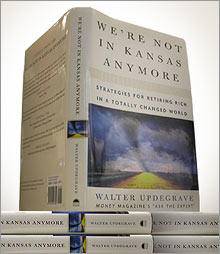|
|
|
|
|
|

|
|
More information on Updegrave's new book.
|
|
|
NEW YORK (CNN/Money) -
I'm 42 years old and have about 95 percent of my money in stocks (70 percent large-company stocks, 15 percent small company and 10 percent international) with the rest in cash and bonds. Everything I read says now is not a good time to get into bonds, but should I have more bond exposure?
-- John Frain, St. Louis, Missouri
I think you're absolutely right. Everything you read says now is not a good time to get into bonds. For a variety of reasons -- the weak dollar, the burgeoning budget deficit, rising commodity prices -- pundits are predicting that interest rates will rise, which would be bad for bonds.
I also think, however, you're right to consider putting more of your portfolio in bonds.
It may sound like I'm being wishy-washy here, but I'm not. The issue you must address is whether you should be making your investment decisions on the basis of what people expect might happen over the short term.
I think the answer is relatively straightforward. Even if you're relatively young, there are two good reasons your portfolio ought to have bonds.
The first is that adding bonds to a nearly all-stock portfolio can dampen volatility. That's important because you may be less likely to engage in panic selling when the stock market is getting hammered.
The second reason is simply a matter of hedging. Yes, stocks have outperformed bonds over the long term. Statistics just in from investment research firm Ibbotson Associates show that from 1926 through 2004, stocks gained an annualized 10.4 percent a year vs. just 5.5 percent for bonds. I expect that stocks will continue to outperform over long periods of time. But I don't think you should bet every cent of your money on that expectation.
But is now the time?
Some people may agree that adding bonds to a portfolio makes sense, but say that now is not the right time. They worry that interest rates are about to head north, and that moving into bonds now is inviting a loss.
I sympathize with that view, but wouldn't invest on the basis of it.
Why? Well, for one thing, interest rate movements are hard to predict. About a year ago virtually everyone was predicting that rising interest rates would clobber bond holders. In fact, rates did rise, and then fell again.
Overall, bonds had a pretty good year with long-term government bonds returning about 9 percent.
I agree that it's more likely that interest rates will go up rather than down from here. But I don't know that for sure. And I don't know what magnitude the move will be even if it does occur.
I don't think other investors, even the pros, have much more insight into bond rates (especially given how many missed the call on rates early last year).
So my position is if you need money in bonds, put it in bonds now, and don't try to predict where interest rates will go. That said, I do think it makes sense to keep rates to the short-to-intermediate end of the maturity spectrum (say, 5 to 7 years or less).
And I think you ought to diversify beyond Treasury bonds, which are most sensitive to interest rates, into corporates and even a smidgen of junk, both of which hold up better than Treasuries when rates rise.
To my mind, the real question you must answer is how much of your portfolio you ought to devote to bonds. 10 percent? 20 percent? 30 percent? There's no percentage that applies to everyone.
The percentage you choose should depend on how long your money will remain invested (the longer your time horizon, the more stocks you should own); how much you're willing to let your portfolio's value fluctuate on a short-term basis (the more flightiness you can tolerate, the lower your bond position); and the size of the returns you need to reach goals like retirement (the higher the return, the less you'll put in bonds).
Our Asset Allocator tool can help you make that decision.
By the way, our Asset Allocator will also give you some guidelines on how to spread your money among different types of equities, although, based on the portfolio you've sketched out in your question, I have to say it looks like you've got the stock mix pretty much nailed. Add the bonds, and you'll be in good shape.
Walter Updegrave is a senior editor at MONEY Magazine and is the author of "We're Not in Kansas Anymore: Strategies for Retiring Rich in a Totally Changed World."

|